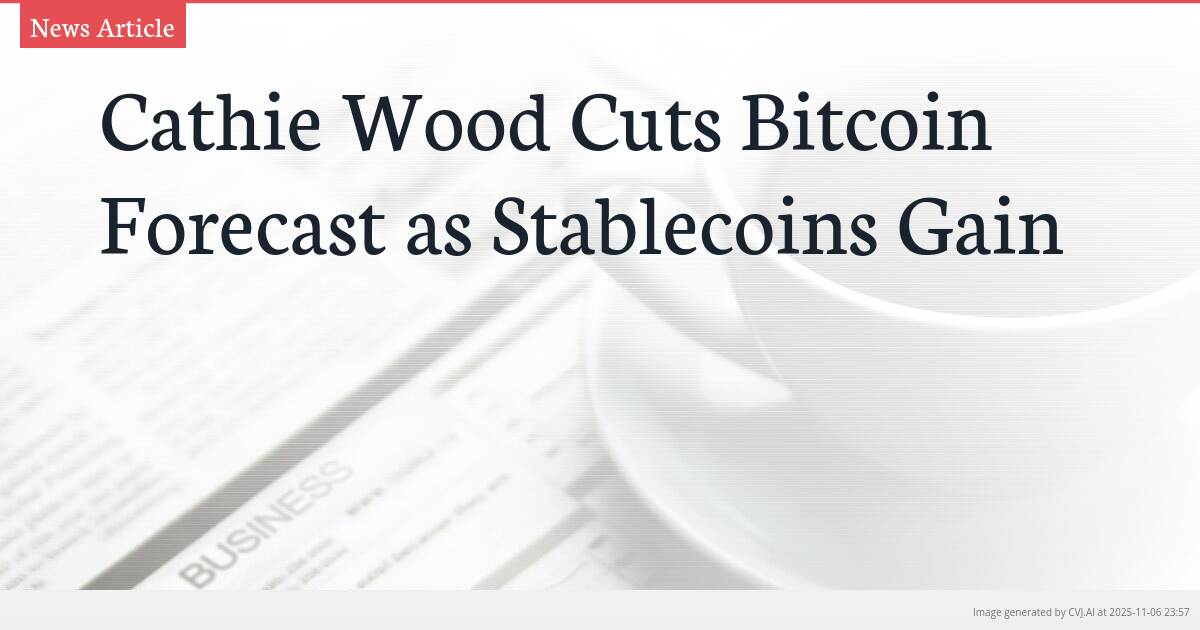This summary text is fully AI-generated and may therefore contain errors or be incomplete.
Introduction
ARK Invest’s Cathie Wood has significantly reduced her long-term Bitcoin price projection, citing stablecoins’ unexpected growth in emerging markets. She warns that dollar-pegged cryptocurrencies are eroding Bitcoin’s role as a store of value in developing economies. This marks a notable shift from her previous bullish $1.5 million Bitcoin forecast.
Key Points
- Wood reduced her Bitcoin price target from $1.5M to $1.2M for 2030
- Stablecoins are growing faster than expected as store-of-value assets in emerging markets
- This represents a significant shift in Bitcoin's perceived competitive positioning against stable assets
A Significant Forecast Revision
In a notable departure from her previously optimistic stance, ARK Invest CEO Cathie Wood has cut her long-term Bitcoin price projection by $300,000. Wood, who previously forecast Bitcoin reaching $1.5 million by 2030, now projects a top price of $1.2 million for the cryptocurrency. This substantial revision represents one of the most significant public reassessments by a prominent Bitcoin bull and signals growing concerns about Bitcoin’s competitive positioning in the global digital asset landscape.
The revised forecast came during Wood’s appearance on CNBC, where she directly addressed the changing dynamics between Bitcoin and stablecoins. Wood’s acknowledgment that stablecoins are ‘usurping part of the role that we thought Bitcoin would play’ marks a fundamental shift in how institutional investors view the cryptocurrency’s long-term value proposition. This adjustment reflects deeper structural concerns about Bitcoin’s adoption trajectory in key growth markets.
Stablecoins' Unexpected Dominance in Emerging Markets
The core driver behind Wood’s revised outlook centers on stablecoins’ rapid adoption as store-of-value assets in emerging market economies. Wood emphasized that ‘stablecoins are scaling here, I think, much faster than anyone would have expected,’ particularly in developing nations where currency volatility and economic instability have traditionally driven interest in alternative stores of value. This unexpected growth pattern challenges earlier assumptions that Bitcoin would naturally dominate this crucial market segment.
Dollar-pegged stablecoins have demonstrated particular appeal in emerging markets where local currencies face depreciation pressures and capital controls limit traditional dollar access. The stability offered by these assets, combined with the efficiency of blockchain transfers, has created a compelling value proposition that directly competes with Bitcoin’s original use case as a decentralized store of value. Wood’s comments suggest that ARK Invest’s research now indicates stablecoins are capturing market share that many analysts, including herself, had previously allocated to Bitcoin.
Implications for Bitcoin's Store-of-Value Narrative
Wood’s forecast revision strikes at the heart of Bitcoin’s fundamental investment thesis as a digital gold and inflation hedge. The acknowledgment that stablecoins are eroding Bitcoin’s store-of-value role in emerging markets represents a significant challenge to one of Bitcoin’s core value propositions. This development suggests that in markets where currency stability is the primary concern, dollar-pegged assets may offer a more immediately practical solution than Bitcoin’s price-volatile alternative.
The competitive dynamic between Bitcoin and stablecoins highlights a fundamental tension in cryptocurrency adoption strategies. While Bitcoin offers decentralization and censorship resistance, stablecoins provide price stability and regulatory familiarity that may prove more appealing in jurisdictions with underdeveloped financial infrastructure. Wood’s comments indicate that ARK Invest now believes stablecoins’ practical advantages in emerging markets may limit Bitcoin’s total addressable market in these crucial growth regions.
This reassessment comes amid broader market recognition that different cryptocurrency assets may serve complementary rather than competing roles in the global financial ecosystem. However, Wood’s specific concern focuses on the store-of-value function where Bitcoin was expected to maintain clear dominance. The rapid scaling of stablecoins in emerging markets suggests that regulatory clarity and infrastructure improvements are accelerating adoption of dollar-pegged assets faster than many analysts anticipated.
📎 Read the original article on cointelegraph.com

